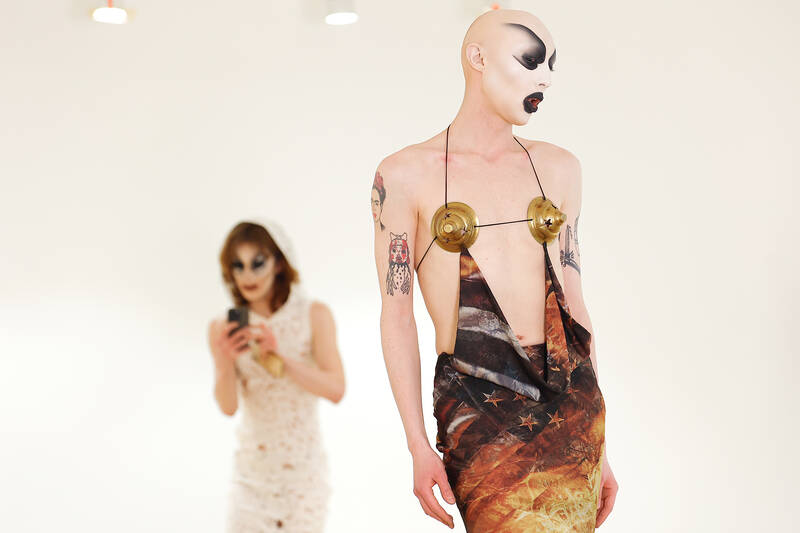Paris Women’s Fashion Week kicked off on Monday with young new labels dominating the catwalks before a trio of hotly awaited designer debuts at Givenchy, Dries Van Noten and Tom Ford in the coming days.
The opening of the world’s biggest fashion week also saw demonstrations from the People for the Ethical Treatment of Animals (PETA) charity and the Brigitte Bardot Foundation to demand the industry stop using animal hides.
Dressed in fake prehistoric fur outfits, five PETA activists held up placards reading “Leave The Stone Age” in front of the French Fashion Institute, while the Brigitte Bardot Foundation sent billboards on trucks denouncing the use of animals for fashion around the City of Light. Fur and sheepskin jackets are back in fashion, with experts like Simon Longland, director of fashion buying at Harrods in London, saying the shearling coat is “set to be the ultimate wardrobe investment” for Fall-Winter 2025.

Photo: EPA-EFE
“We’re here to demand that Paris joins London, Copenhagen and Amsterdam too in banning the use of fur on their catwalks,” PETA spokeswoman Natasha Garnier said.
On the runways, France’s Victor Weinsanto, Japanese label CFCL and New York’s Vaquera held their shows Monday before the bigger corporate luxury jugganauts unveil their Fall-Winter collections later this week. Japanese designer Yusuke Takahashi, who founded CFCL (Clothing For Contemporary Life) just under five years ago, sent out models in knitwear outfits in primary colors, inspired partly by furniture from the 1980s. There was no fur or animal hide in sight, with Takahashi making elaborate use of his favorite material, recycled polyester, which was used for 90 percent of the collection.
“We really focused on knit technology and making new products,” he told reporters afterwards.

Photo: AFP
Victor Weinsanto, an up-and-coming designer from eastern France, stressed that he only used fake leather and fur in his collection in mostly neutral wintery colours of white, beige and black, with a splash of 1980s-style shade of purple.
DEBUTS
Over the next eight days, more than 100 fashion houses will unveil their Fall-Winter 2025-2026 collections, hoping to rally sales in what is an increasingly difficult global luxury market.

Photo: EPA-EFE
Among the most anticipated will be Sarah Burton’s debut at Givenchy on Friday, with the French label given a boost by Hollywood star Timothee Chalamet, who wore a yellow Givenchy suit at the Oscars ceremony at the weekend.
Burton, a 51-year-old Briton who made her name as creative director at Alexander McQueen, was appointed to Givenchy in September.
“Givenchy has a very beautiful history,” she told Vogue in a profile last month. “It appeals to me because it’s a small house, and it’s in Paris.”
Burton is one of a number of recent changes at major brands, with Belgian veteran Dries Van Noten stepping down from his eponymous label last year and handing the reins to fellow countryman Julian Klausner, 33.
Klausner’s first collection on Wednesday will be closely scrutinized. The French Haute Couture and Fashion Federation has also pulled off a coup by luring Tom Ford, a mainstay of New York Fashion Week, to Paris for the first time.
Chief designer Haider Ackermann, in the top job at Tom Ford since September and also tasked with leading a brand defined by its founder, will also be making his catwalk debut on Wednesday.
DOWNTURN
French luxury heavyweights Louis Vuitton, Dior, Saint Laurent and Chanel will produce the biggest budget shows this week, with their front row seats fought over by celebrities and influencers. Dior’s show on Tuesday could be the last from head designer Maria Grazia Chiuri, with persistent rumors and press reports that she is on the way out. Northern Irish stylist Jonathan Anderson, who is currently at the helm of Spanish label Loewe, is tipped as her potential replacement.
The luxury industry as a whole has seen profits fall and sales slow.
Paris-based LVMH, Europe’s largest company by market value, reported a 17 percent fall in annual net profits which it attributed to the end of the luxury-buying “euphoria” following the COVID-19 pandemic.
Analysts see weakness in the key luxury market of China, reduced appetite for high-priced goods, and widespread economic uncertainty as other reasons for the decline.
Fellow French luxury giant Kering reported a 62 percent drop in profits last year, largely due to struggles at its flagship Gucci brand. Elsewhere on Monday, the Financial Times reported that Prada had emerged as the frontrunner to buy fellow Italian label Versace from Capri Holdings for about 1.5 billion euros (US$1.6 billion).
The takeover would combine two of Italy’s best-known luxury fashion brands.

Towering high above Taiwan’s capital city at 508 meters, Taipei 101 dominates the skyline. The earthquake-proof skyscraper of steel and glass has captured the imagination of professional rock climber Alex Honnold for more than a decade. Tomorrow morning, he will climb it in his signature free solo style — without ropes or protective equipment. And Netflix will broadcast it — live. The event’s announcement has drawn both excitement and trepidation, as well as some concerns over the ethical implications of attempting such a high-risk endeavor on live broadcast. Many have questioned Honnold’s desire to continues his free-solo climbs now that he’s a

As Taiwan’s second most populous city, Taichung looms large in the electoral map. Taiwanese political commentators describe it — along with neighboring Changhua County — as Taiwan’s “swing states” (搖擺州), which is a curious direct borrowing from American election terminology. In the early post-Martial Law era, Taichung was referred to as a “desert of democracy” because while the Democratic Progressive Party (DPP) was winning elections in the north and south, Taichung remained staunchly loyal to the Chinese Nationalist Party (KMT). That changed over time, but in both Changhua and Taichung, the DPP still suffers from a “one-term curse,” with the

Lines between cop and criminal get murky in Joe Carnahan’s The Rip, a crime thriller set across one foggy Miami night, starring Matt Damon and Ben Affleck. Damon and Affleck, of course, are so closely associated with Boston — most recently they produced the 2024 heist movie The Instigators there — that a detour to South Florida puts them, a little awkwardly, in an entirely different movie landscape. This is Miami Vice territory or Elmore Leonard Land, not Southie or The Town. In The Rip, they play Miami narcotics officers who come upon a cartel stash house that Lt. Dane Dumars (Damon)

Jan. 26 to Feb. 1 Nearly 90 years after it was last recorded, the Basay language was taught in a classroom for the first time in September last year. Over the following three months, students learned its sounds along with the customs and folktales of the Ketagalan people, who once spoke it across northern Taiwan. Although each Ketagalan settlement had its own language, Basay functioned as a common trade language. By the late 19th century, it had largely fallen out of daily use as speakers shifted to Hoklo (commonly known as Taiwanese), surviving only in fragments remembered by the elderly. In